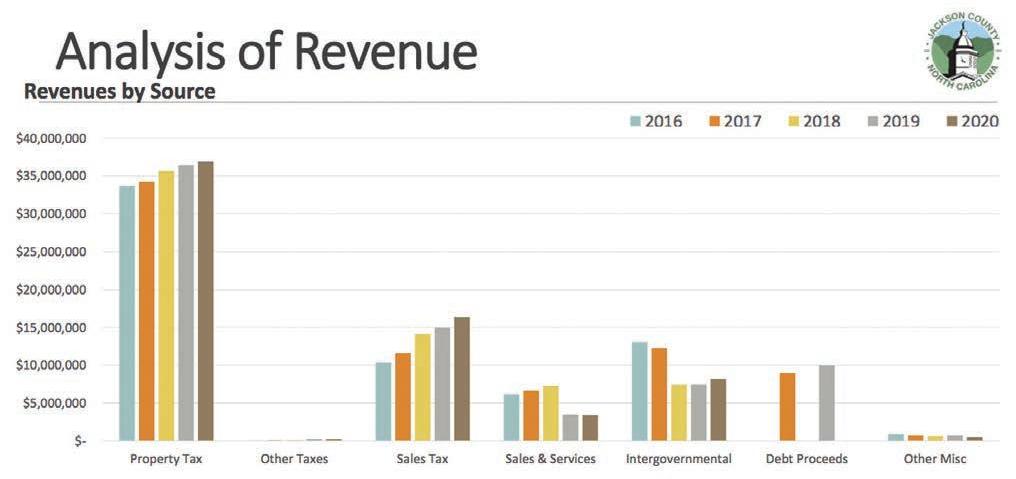
16 minute read
Jackson forecasts budget increase
School, park, justice center projects top capital wish list
BY HOLLY KAYS STAFF WRITER
Despite the dire predictions of spring 2020, Jackson County’s budget prognosis for the 2021-2022 fiscal year is looking downright positive, commissioners learned during a Feb. 23 budget retreat.
When the pandemic hit last year, Jackson County leaders reacted by passing a budget that assumed an 8 percent drop from the previous year’s sales tax collections. Instead, the county saw record-high sales tax collections and a bump in property tax collections following the completion of multiple new construction projects. As a result, County Manager Don Adams told the board, Jackson County will see $1.35 million in new spending capacity due to increased tax revenues over the coming year.
About two-thirds of that is spoken for already. The county will need $398,000 to give its employees a 2 percent raise, as well as $265,000 to pay for increased operational expenses at Southwestern Community College following completion of the Health Sciences Building this summer. Increased health insurance costs will run the county $187,277, representing a 3 percent increase — a number that caused a sigh of relief for commissioners who had grown used to percentage increases in the double digits.
However, the $496,000 net capacity increase does not account for any position adjustments or the standard increases typically given to the Board of Education, SCC and the library.
Also not accounted for in that number are the results of the 2021 property revaluation, which yielded a substantial increase in overall taxable value. Tax bills based on the new values will be mailed out in August, with payments considered late after Jan. 6, 2022. Keeping the same tax rate under the new, higher valuation would yield more revenue for the county, but commissioners could choose to lower the rate to keep property owners’ total bills simi- F
Contrary to initial predictions, sales and property tax revenues for 2020 increased compared to previous years. Jackson County graph

Triple-win climate solutions: Weatherize for savings and comfort
"Nature never did betray the heart that loved her." — William Wordsworth, 1798
Record-smashing winter weather across the U.S. this month is making some of us notice drafty windows and doors or pockets of cold air in our houses and apartments.
When extended power outages occur, these problems become more than annoyances. Fortunately, simple changes and upgrades can solve most of them, and your power company will conduct free energy audits to pinpoint the most effective fixes. A good start is usually the attic. The U.S. Department of Energy (DOE) recommends that attic insulation have R values of 38 to 60.
The DOE estimates that 40% of home energy loss is caused by unnecessary air leaks. Common energy wasters are inadequate weatherstripping around outside doors, leaks around windows, insufficient attic insulation, and gaps around ductwork.
Multi-family housing with inadequate insulation and other energy-wasters should be fixed for the sake of the landlord as well as tenants. Poorly-insulated dwellings can contribute to some renters having their power cut off because their bills skyrocket. Old gas space heaters running unsupervised all night can be fire hazards.
About 20 percent of US fossil fuel emissions come from homes. A U.S. professional organization the National Academy of Sciences and climate scientists elsewhere urge energy upgrades to buildings to reduce these contributors to the climate crisis.
WIN-WIN-WIN
1) By making our homes more efficient, we save money on power bills while contributing to local employment. 2) We are more comfortable, especially during extreme weather. 3) We are helping today’s babies and children have a future with fewer weather catastrophes.
After getting an energy audit, carry out as many energy upgrades as you can afford. Rebates are likely to help. 2. If you plan to build a home or are a developer or public housing agency, join the new movement of smaller, more energy-efficient housing. Well-designed small homes have plenty of storage, and they feel spacious and airy. 3. If you are a landlord, get an energy audit of your properties and follow through with repairs and upgrades. 4. To save more money on power bills, unplug— don’t just turn off—every small electrical device when not using it. See the Forbes
Magazine “Top 26 Energy Hogs, Turned Off” link below. 5. If you haven’t replaced conventional light bulbs with LED bulbs, even a few make a difference. They last so much longer, too. 6. More ideas and resources from Southern Living Magazine: www.southernliving.com/syndication/smart-home-strategies-to-maximize -your-energy-efficiency
WHAT YOU NEED TO ACT NOW
• Duke Energy free home audit for single-family homeowners: www.dukeenergy.com/home/products/home-energyhouse-call • Duke Energy Progress energy-saving products and services for businesses, including landlords: www.duke-energy.com/business/pro-
ducts • Haywood EMC: adventure.touchstoneenergy.com/choosePath • U.S. Department of Energy Home Energy
Guide: www.energy.gov/energysaver/services/energy-saver-guide-tips-saving-moneyand-energy-home • Descriptions of new eco-friendly insulation materials: www.tinyecohomelife.com/besteco-friendly-insulation/ • Southern Living Magazine, “30+ Small House
Plans That Are Just the Right Size”: www.southernliving.com/homegarden/small-house-plans
WHO SAYS—THE EXPERTS
• National Academy of Sciences. Research article “The carbon footprint of household energy use in the United States” www.pnas.org/content/early/2020/07/14/192 2205117 • Forbes Magazine, “Top 26 Energy Hogs, Turned
Off” www.forbes.com/pictures/efee45gejh/no-24crt-computer-display/#e3484bce1558
Mary Jane Curry edits the WNC Climate Action Coalition column Triple-win Climate Solutions. She is a ClimateReality® Leader and a retired university teacher-researcher. Alexandra Kirtley designed our logo and manages our website wncclimateaction.com

lar to what they’re currently paying. Commissioners will discuss these issues during a work session at 1 p.m. Thursday, March 11. That meeting will stream at bit.ly/jacksongov.
Meanwhile, commissioners face a number of competing priorities for that new funding.
The largest list of requests comes from Jackson County Public Schools, which has eight priority projects requiring a total of $16 million to complete, in addition to a $4.5 million school safety project to convert its campuses to a single point-of-entry design that is already moving forward.
These projects include ADA compliance upgrades to the Smoky Mountain High School football stadium, which would cost between $70,000 and $250,000; slope stabilization following a landslide that occurred last year on the Scotts Creek Elementary School property, $800,000 to $1 million; a larger cafeteria and new classrooms at Fairview Elementary School, $4.5 million; a track for Smoky Mountain High School on the Jones Street property bought for that


purpose, $750,000; a softball field upgrade at Fairview, $1 million; gym, performance stage and classroom renovations at Blue Ridge School, $5 million; a new bus garage, $2.5 million; and HVAC upgrades at the Smoky Mountain High School auxiliary gym, $1 million.
The school system’s top priority is the single point-of-entry safety upgrade, said Interim Superintendent Tony Tipton, but after that the next two priorities are football stadium upgrades and the cafeteria classrooms at Fairview. Additionally, multiple commissioners expressed a desire to complete projects at Smoky Mountain High School that would close out needs outlined in the school’s master plan, which is now nearly 20 years old.
However, commissioners are considering more than order of priority when planning these projects. They are weighing the possibility of a new state bond referendum, as well as which projects on the list are most likely to be funded with bond money. After investigating that question, Adams told commissioners that the $4.5 million project at the Fairview cafeteria and the $5 million Blue Ridge gym project would be most likely to qualify for bond funding. Removing that $9.5 million would leave commissioners with a list that could be reasonably accomplished within the next four or five years.
“I say that not to move Fairview down the list, but there’s some value to waiting for any real conversations on that until we can see what happens with the state bond,” Adams said.
Commissioners are considering more than just public school projects. For years now, Jackson County Superior Court Judge Brad Letts has been telling commissioners that the courts need more space. Adams put down $1.5 million as a placeholder number for that project, but the true cost is unknown — especially because most of the county’s administrative functions are located in the same building as the courtrooms. The final cost will depend on whether those functions must be relocated, as well as on the cost of the expansion itself. Adams told commissioners that he’d start the process of selecting an architect for the project, and that person would help them discover its true scope.
The board also spent a great deal of time talking about parks. For years, commissioners have been pushing to develop a pocket park in the Whittier community, but that has proven more difficult than expected, said Adams.
“The only properties we’ve been finding so far run a half million plus,” he said. “What that does is it turns a pocket park conversation in Whittier to a million-dollar-plus conversation.”
When the county first started using the phrase “pocket park,” it was with the understanding such a park might cost around $250,000, but the small park recently completed in the Savannah community ultimately cost twice that. If that’s how much these projects are going to run, Adams said, commissioners should consider funding them as part of the county’s Capital Improvement Plan rather than relying on dollars from its Conservation Preservation Recreation Fund.
Other park projects on the list include river parks at Cullowhee and Dillsboro, and the Fairview Recreation Complex.
“This is a list where I don’t know that we can give you a definitive answer today,” Chairman Brian McMahan told Adams after some discussion among the board members. “The consensus I’m hearing is that the Fairview Complex is ready to happen now. It is probably the most important to move on. The others have some moving parts to them that I don’t know that we could sit here and tell you which one to focus on next.”
The Feb. 23 meeting was the first of several meetings planned to shape the 2021-22 budget, with the next one occurring at 1 p.m. Thursday, March 11, to discuss revenue. New budget requests from county departments and nonprofits will be presented during the April 13 work session, and during the work session on May 11, commissioners will discuss capital projects and new requests. Adams will present his recommended budget during the May 18 regular meeting, and the final document is scheduled for adoption June 15.
Stay informed
Jackson County commissioners will discuss revenue-related decisions such as the property tax rate during a work session at 1 p.m. Thursday, March 11, at the Cullowhee Fire Department. The meeting will livestream at bit.ly/jacksongov.
We offer a variety of storage types. Rent Boat, Climate Controlled, RV, and Self Storage from us today.



Conveniently located in Sylva, Franklin, Canton/Clyde, & Waynesville!

Sylva & Franklin: 828-586-3438 Canton/Clyde & Waynesville: 828-646-3981 a1storageamerica.com


JustDoOils.com
Haywood Square | 288 N. Haywood St. | Waynesville

Curves to Cure What Ails You

BY HANNAH MCLEOD STAFF WRITER
Maggie Valley town officials are cautiously optimistic about the coming budget year after preliminary reports show the pandemic did not have the devastating financial effect many had originally feared.
At a March 8 budget retreat, the Maggie Valley Board of Aldermen and staff were upbeat about the 2021-22 budget. The actual budget for the upcoming fiscal year does not have to be approved until June 30.
Town Manager Nathan Clark and aldermen discussed some projects that are three to five years down the line as they look to future development in the town. For Maggie Valley, much of that economic development rests on the shoulders of its natural beauty. Almost all of the major projects planned for the 2021-22 budget and beyond relate in some capacity to beautification, tourism and ecological development. These are projects that in turn increase property values in Maggie.
Clark recommended a tax rate decrease from the current 43 cents per $100 of property value. He recommended a rate between 39 and 41 cents, which he says make sense based on the current projections about about the county’s revaluation of real property. Most residents can expect increases in their home values, meaning the town can decrease tax rates and still collect the same amount of revenue.
The improvement project approved for Soco Road in March 2020 was halted shortly after town approval due to DOT budget complexities during the pandemic. According to Clark, all DOT projects have since been given permission to resume and the town is meeting with NCDOT and American Engineering to review designs for the project. Clark said it could be complete in one to two years.
The town has been working for several years to renovate the Town Hall building. During the pandemic year those improvements were halted, partly for budget concerns and partly because there were less visitors to the building. Improvements could begin again this year and take place over the next several years with work on the entrance, cafeteria and common area.
Town hall may also become home to a new veteran’s memorial statue and a public works storage building. The memorial statue was mentioned by every alderman as they listed their budget priorities. Possible designs were discussed but the memorial statue will likely be placed outside of town hall and include a plaque commemorating veterans’ service.
A storage building will be constructed and used to store town decorations in the off season, including the new, extra-large “Ski Town” sign. The town is leaning toward putting the storage building on town hall property to minimize costs for the needed space. The cost is estimated at $125,600.
Even more upgrades are likely in store for the festival grounds. Clark and aldermen discussed the importance of the festival grounds for driving economic development by bringing large scale events to Maggie Valley, like the drive-in concert series that was able to continue even through pandemic restrictions. The town discussed improvements to the pavilion at the festival grounds, which was constructed in 1995. The Wi-Fi network, installed in 2013, is also in need of an upgrade. According to Clark, vendors at the festival grounds have Wi-Fi connectivity issues regularly.
Another project likely to take off in 2021 is the waterfall park project proposed for the Old Still Road waterfall property. In 2020 the town hired Mosaic Civic Studio to create conceptual development plans for a waterfall park on the property. Because the 8-acre property the town owns is situated in a residential area, public feedback has been mixed.
Mayor Mike Eveland said that regardless of what decision the town comes to, it will move forward this year. The town has owned the property since the early 2000s and has not developed it in that time. Eveland said the town will either decide to develop the property or sell it.
Several budget items are likely in store for the Maggie Valley Police Department. The most pressing of which may be the policy and procedure manual updates. Due to changing attitudes around policing and best practices, local police departments are having to review their policies. Maggie Valley Police Chief Russ Gilliland said the department will need up to $10,000 to pay a police department specialty law firm to help review policies and procedures.
The police department is also looking to purchase another dog to enhance the K-9 unit so that there can be a dog on every shift, a new police department server, two new police cars, and in-car camera systems.
Gilliland noted that there is more legislation coming down the line that, if passed, would further change the logistics and legalities of policing. If that legislation becomes law, it could mean more police budget necessities.



N.C. Department of Transportation crews will perform a difficult repair on U.S. 64 at Bridal Veil Falls in Macon County from March 29 to April 16.
The highway will be closed to traffic from 9 a.m. to 6 p.m. each day and will operate in a one-lane pattern with a traffic signal overnight for the duration of the operation. The one-lane pattern will remain in place from April 2-5 for Easter weekend.
“These repairs need to be made in order to secure the structural integrity of the road,” Division 14 Maintenance Engineer Wesley Grindstaff said. “It’s necessary to limit the possibility of long-term damage to the highway, and it’s necessary for the safety of visitors and residents in the area.”
Traffic will be detoured on Buck Creek Road when the road is closed. Drivers heading east from Franklin will turn left onto Buck Creek Road and follow it for 11 miles until the intersection with U.S. 64 east of Highlands. Drivers heading west from Highlands will take U.S. 64 east out of town and turn left onto Buck Creek Road. All drivers should factor extra time into their travels.
Heavy rains from Hurricane Zeta in October damaged the drainage pipe under U.S. 64 that carries water from the popular natural attraction under the highway and washed away material supporting the highway.
NCDOT crews will remove the broken pipe and install a new pipe under the roadway. They will also rebuild the slope below the road by building a new embankment one stone at a time. NCDOT officials have developed a plan with the U.S. Forest Service to limit impacts on the forest below the road.
“Rebuilding the slope will be very tedious work in very tight quarters,” Grindstaff said. “Instead of dumping stones, each stone will have to be passed from excavator to excavator one at a time. Crews will work as safely and efficiently as possible to have the road safely open to full capacity as soon as possible.”
WCU to have in-person commencement
After a series of virtual commencement ceremonies due to COVID-19 in 2020, Western Carolina University will resume modified, in-person commencement activities this spring for the class of 2021.
The ceremonies will take place the weekend of May 14-16 and will comply with the governor’s current executive order regarding mass gatherings. Face coverings will be required of all graduates and guests and commencement will be livestreamed. Specific details on times and locations will be forthcoming.
The decision to hold in-person commencement ceremonies comes after Chancellor Kelli Brown announced that the university is planning to resume, conditions permitting, an academic and on-campus schedule in August that is as normal as possible.












